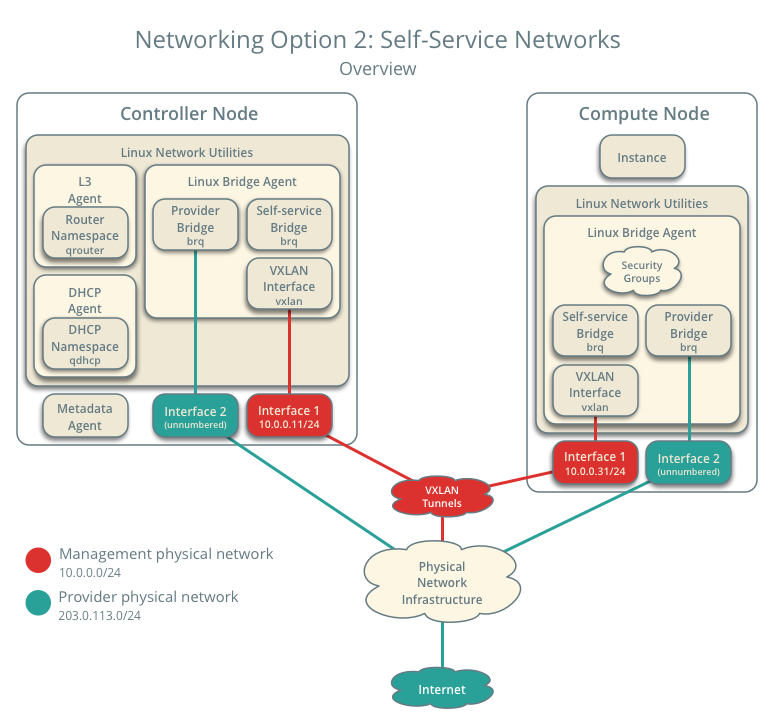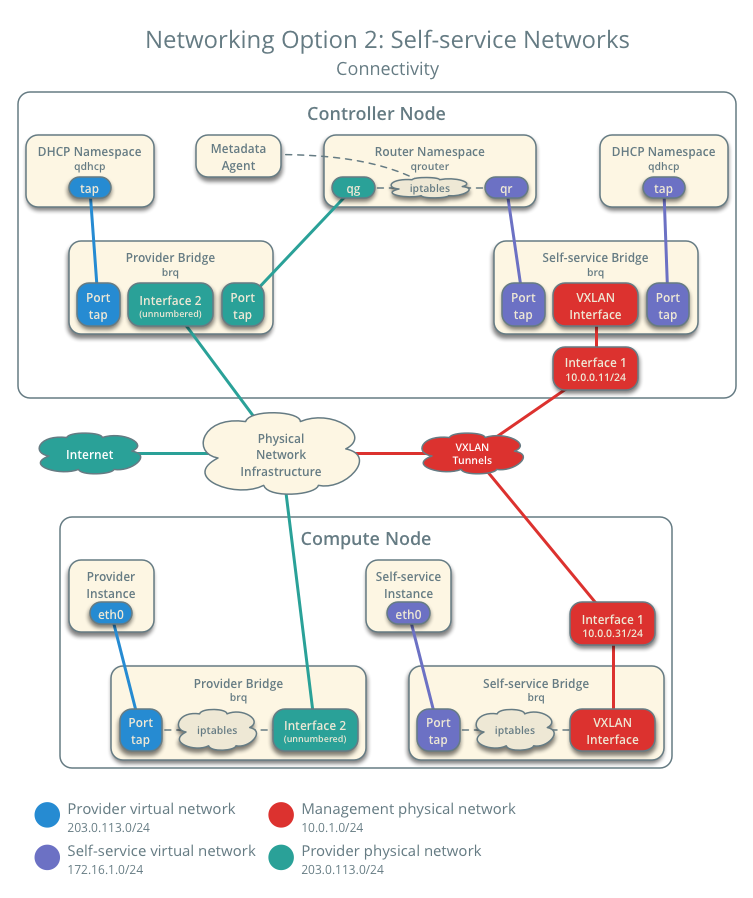Self-service network¶
If you chose networking option 2, you can also create a self-service (private) network that connects to the physical network infrastructure via NAT. This network includes a DHCP server that provides IP addresses to instances. An instance on this network can automatically access external networks such as the Internet. However, access to an instance on this network from external networks such as the Internet requires a floating IP address.
The demo or other unprivileged user can create this network because it
provides connectivity to instances within the demo project only.
Varování
You must create the provider network before the self-service network.
Poznámka
Následující pokyny a schémata používají vzorové rozsahy IP adres. Musíte si je přizpůsobit tak, aby odpovídaly vašemu prostředí.

Volba sítě 2: Samoobslužné sítě - přehled

Volba sítě 2: Samoobslužné sítě - propojení
Create the self-service network¶
V uzlu kontroléru použijte příkaz source pro přihlašovací údaje pro
demopro získání přístupu k příkazům příkazového řádku pro uživatele:$ . demo-openrcVytvořte síť:
$ openstack network create selfservice Created a new network: +-------------------------+--------------------------------------+ | Field | Value | +-------------------------+--------------------------------------+ | admin_state_up | UP | | availability_zone_hints | | | availability_zones | | | created_at | 2016-11-04T18:20:59Z | | description | | | headers | | | id | 7c6f9b37-76b4-463e-98d8-27e5686ed083 | | ipv4_address_scope | None | | ipv6_address_scope | None | | mtu | 1450 | | name | selfservice | | port_security_enabled | True | | project_id | 3828e7c22c5546e585f27b9eb5453788 | | project_id | 3828e7c22c5546e585f27b9eb5453788 | | revision_number | 3 | | router:external | Internal | | shared | False | | status | ACTIVE | | subnets | | | tags | [] | | updated_at | 2016-11-04T18:20:59Z | +-------------------------+--------------------------------------+
Non-privileged users typically cannot supply additional parameters to this command. The service automatically chooses parameters using information from the following files:
ml2_conf.ini:[ml2] tenant_network_types = vxlan [ml2_type_vxlan] vni_ranges = 1:1000
Vytvořte podsíť:
$ openstack subnet create --network selfservice \ --dns-nameserver DNS_RESOLVER --gateway SELFSERVICE_NETWORK_GATEWAY \ --subnet-range SELFSERVICE_NETWORK_CIDR selfservice
DNS_RESOLVERnahraďte IP adresou překladače DNS. Ve většině případů lze použít jednu ze souboru/etc/resolv.confv hostiteli.Replace
SELFSERVICE_NETWORK_GATEWAYwith the gateway you want to use on the self-service network, typically the „.1“ IP address.Replace
SELFSERVICE_NETWORK_CIDRwith the subnet you want to use on the self-service network. You can use any arbitrary value, although we recommend a network from RFC 1918.Příklad
The self-service network uses 172.16.1.0/24 with a gateway on 172.16.1.1. A DHCP server assigns each instance an IP address from 172.16.1.2 to 172.16.1.254. All instances use 8.8.4.4 as a DNS resolver.
$ openstack subnet create --network selfservice \ --dns-nameserver 8.8.4.4 --gateway 172.16.1.1 \ --subnet-range 172.16.1.0/24 selfservice Created a new subnet: +-------------------+--------------------------------------+ | Field | Value | +-------------------+--------------------------------------+ | allocation_pools | 172.16.1.2-172.16.1.254 | | cidr | 172.16.1.0/24 | | created_at | 2016-11-04T18:30:54Z | | description | | | dns_nameservers | 8.8.4.4 | | enable_dhcp | True | | gateway_ip | 172.16.1.1 | | headers | | | host_routes | | | id | 5c37348e-e7da-439b-8c23-2af47d93aee5 | | ip_version | 4 | | ipv6_address_mode | None | | ipv6_ra_mode | None | | name | selfservice | | network_id | b9273876-5946-4f02-a4da-838224a144e7 | | project_id | 3828e7c22c5546e585f27b9eb5453788 | | project_id | 3828e7c22c5546e585f27b9eb5453788 | | revision_number | 2 | | service_types | [] | | subnetpool_id | None | | updated_at | 2016-11-04T18:30:54Z | +-------------------+--------------------------------------+
Vytvoření směrovače¶
Self-service networks connect to provider networks using a virtual router that typically performs bidirectional NAT. Each router contains an interface on at least one self-service network and a gateway on a provider network.
The provider network must include the router:external option to
enable self-service routers to use it for connectivity to external networks
such as the Internet. The admin or other privileged user must include this
option during network creation or add it later. In this case, the
router:external option was set by using the --external parameter
when creating the provider network.
V uzlu kontroléru použijte příkaz source pro přihlašovací údaje pro
adminpro získání přístupu k příkazům příkazového řádku pro správce:$ . admin-openrcPoužijte příkaz source pro přihlašovací údaje pro
demopro získání přístupu k příkazům příkazového řádku pro uživatele:$ . demo-openrcVytvořte směrovač:
$ openstack router create router Created a new router: +-------------------------+--------------------------------------+ | Field | Value | +-------------------------+--------------------------------------+ | admin_state_up | UP | | availability_zone_hints | | | availability_zones | | | created_at | 2016-11-04T18:32:56Z | | description | | | external_gateway_info | null | | flavor_id | None | | headers | | | id | 67324374-396a-4db6-9443-c70be167a42b | | name | router | | project_id | 3828e7c22c5546e585f27b9eb5453788 | | project_id | 3828e7c22c5546e585f27b9eb5453788 | | revision_number | 2 | | routes | | | status | ACTIVE | | updated_at | 2016-11-04T18:32:56Z | +-------------------------+--------------------------------------+
Add the self-service network subnet as an interface on the router:
$ neutron router-interface-add router selfservice Added interface bff6605d-824c-41f9-b744-21d128fc86e1 to router router.
Set a gateway on the provider network on the router:
$ neutron router-gateway-set router provider Set gateway for router router
Ověření funkčnosti¶
We recommend that you verify operation and fix any issues before proceeding. The following steps use the IP address ranges from the network and subnet creation examples.
V uzlu kontroléru použijte příkaz source pro přihlašovací údaje pro
adminpro získání přístupu k příkazům příkazového řádku pro správce:$ . admin-openrcVypište jmenné prostory sítě. Měli by se Vám zobrazit jeden prostor
qroutera dvaqdhcp.$ ip netns qrouter-89dd2083-a160-4d75-ab3a-14239f01ea0b qdhcp-7c6f9b37-76b4-463e-98d8-27e5686ed083 qdhcp-0e62efcd-8cee-46c7-b163-d8df05c3c5ad
List ports on the router to determine the gateway IP address on the provider network:
$ neutron router-port-list router +--------------------------------------+------+-------------------+------------------------------------------+ | id | name | mac_address | fixed_ips | +--------------------------------------+------+-------------------+------------------------------------------+ | bff6605d-824c-41f9-b744-21d128fc86e1 | | fa:16:3e:2f:34:9b | {"subnet_id": | | | | | "3482f524-8bff-4871-80d4-5774c2730728", | | | | | "ip_address": "172.16.1.1"} | | d6fe98db-ae01-42b0-a860-37b1661f5950 | | fa:16:3e:e8:c1:41 | {"subnet_id": | | | | | "5cc70da8-4ee7-4565-be53-b9c011fca011", | | | | | "ip_address": "203.0.113.102"} | +--------------------------------------+------+-------------------+------------------------------------------+
Ping this IP address from the controller node or any host on the physical provider network:
$ ping -c 4 203.0.113.102 PING 203.0.113.102 (203.0.113.102) 56(84) bytes of data. 64 bytes from 203.0.113.102: icmp_req=1 ttl=64 time=0.619 ms 64 bytes from 203.0.113.102: icmp_req=2 ttl=64 time=0.189 ms 64 bytes from 203.0.113.102: icmp_req=3 ttl=64 time=0.165 ms 64 bytes from 203.0.113.102: icmp_req=4 ttl=64 time=0.216 ms --- 203.0.113.102 ping statistics --- rtt min/avg/max/mdev = 0.165/0.297/0.619/0.187 ms
Vraťte se na Spuštění instance - Vytváření virtuálních sítí.

Except where otherwise noted, this document is licensed under Creative Commons Attribution 3.0 License. See all OpenStack Legal Documents.